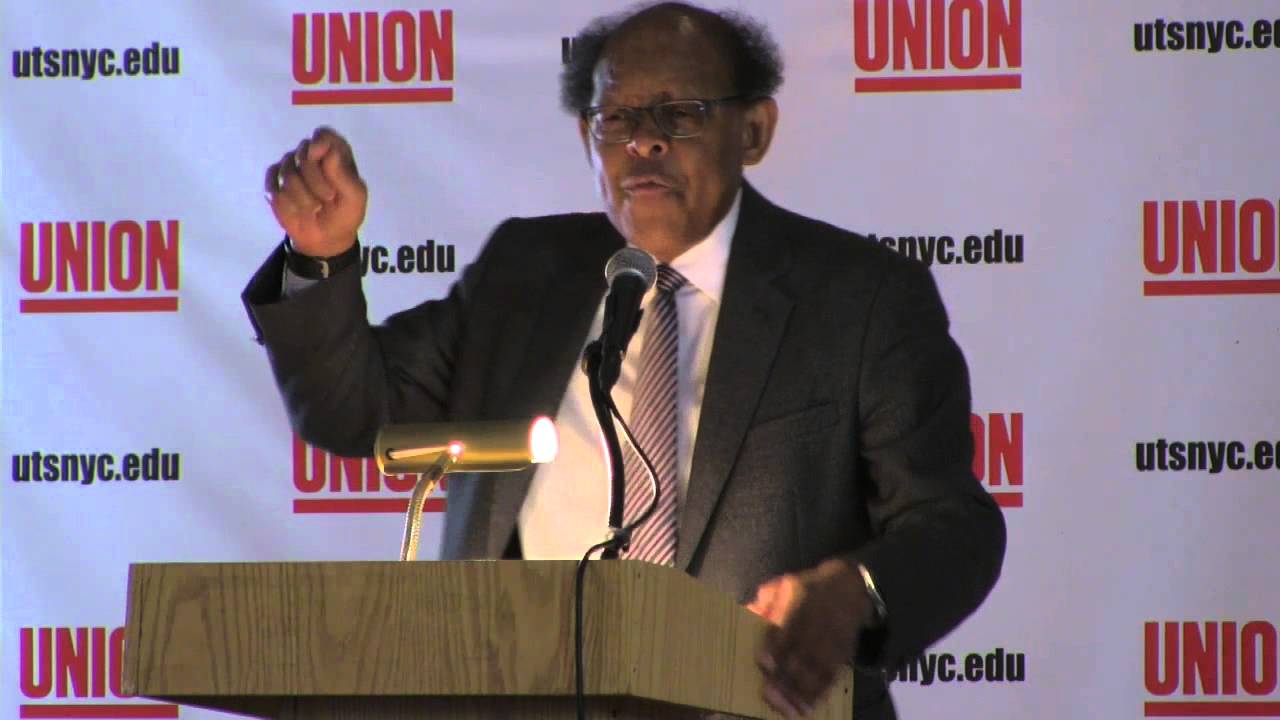The Cry of Black Blood: The Rise of Black Liberation Theology
In a powerful lecture delivered at Union Theological Seminary, James Cone, the Charles A. Briggs Distinguished Professor of Systematic Theology, delve into the foundations of black liberation theology. Cone, considered the founder of this theological perspective, shares his life’s dedication to the subject. His journey was sparked by the cries of black suffering. It involved a profound questioning of God’s role in a world marked by abuse and exploitation [08:16].
A Theological Awakening
Cone’s theological transformation began with a deep engagement with the suffering of black people. This led him to challenge the silence and complicity of white theology and its churches [17:22]. He felt a calling to bear witness. He wanted to understand the redemptive meaning found within the nearly 400 years of suffering endured by his ancestors [09:23]. The Detroit uprising of 1967 served as a catalyst. It ignited his suppressed anger against white supremacy. This compelled him to write [19:08].
Core Theological Claims
Cone’s theology centers on several key claims:
- God as Liberator: Drawing from the Exodus narrative, the prophets’ call for justice, and Jesus’s solidarity with the poor, Cone asserts that the God of the Bible is the liberator of the oppressed [37:12].
- Jesus and the Cross: The cross, for Cone, represents God’s paradoxical entry into history as a vulnerable figure, a slave [41:51]. He draws a parallel between the cross and the lynching tree, arguing that both symbolize a barrier to understanding Jesus’s message for those in positions of dominance [42:21]. Cone clarifies that referring to Jesus and God as “black” is a symbolic expression of God’s identification with the oppressed, not a literal statement about skin color [48:45].
- Holy Spirit as Liberating Presence: The Holy Spirit is understood as God’s empowering presence in the lives of the poor, enabling them to fight for freedom against overwhelming odds [42:57].
Influential Works
Cone’s theological journey is reflected in his influential writings:
- “Black Theology & Black Power” (1969): This groundbreaking work argued that black power is not contrary to the gospel but rather its embodiment in 20th-century America [22:42]. The book’s red cover symbolized the blood shed by those fighting for their humanity [23:21].
- “A Black Theology of Liberation” (1970): This book further developed Cone’s arguments, using a white cover with red text for “Liberation” and a black cross to symbolize the blood of black people, the lynching tree, and the perpetrators of violence [27:00].
- “God of the Oppressed”: In this work, Cone expresses a greater confidence in his theological stance, building upon his previous publications [36:08].
- “The Cross and the Lynching Tree” (2011): Cone’s most recent book, described as deeply moving and searing, explores the profound connection between the cross and the lynching of black individuals [40:37]. It achieved bestseller status and was recognized as a top religion book of 2011 [42:57].
Bible Verses and Literary References
Throughout his lecture, Cone references several key biblical passages and literary works:
- Genesis 4:10: “Your brother’s blood is crying out to me from the ground” [10:47].
- Jeremiah 20:9: “Something like a burning fire shut up in my bones” [15:57].
- Gospel of Thomas: “If you bring forth what is within you, what you bring forth will save you. If you do not bring forth what is within you, what you do not bring forth will destroy you” [21:03].
- Philippians 2: “Taking the form of a slave, becoming obedient to death, even death on the cross” [42:08].
- John 18:37-38 (Pilate and Jesus): “So you are a King? Jesus answered, ‘You say that I’m a king. For this I was born, and for this I came into the world, to testify to the truth. Everyone who belongs to the truth listens to my voice.’ Then Pilate asked him, ‘What is truth?’” [47:39].
- Mark 2:21-22 (New Wine and Old Wine Skin): “No one puts new wine in old wine skin or tears a piece of new cloth and sews it onto an old garment” [52:18].
- John 1:46: “Can anything good come out of Nazareth?” [55:51].
- Fyodor Dostoevsky: “There is only one thing I dread, not to be worthy of my suffering” [08:41].
- Malcolm X: “We declare our rights to be a human being, to be respected as a human being on this Earth, which we intend to bring into existence by any means necessary” [14:52].
- James Baldwin: “It is only in this music… that the Negro in America has been able to tell his story” [32:05].
- Paul Tillich: Theology talks about God as symbolic language, a language of the imagination [50:22].
- Franz Kafka: “Writing as a form of prayer” [59:19].
- Derek Bell: “Surrender is not an option” [01:30:58].
Cone’s lecture offers a powerful and enduring message about the role of faith in the face of oppression. It concludes with a discussion on the ongoing relevance of black liberation theology and its relationship with the church [01:03:00]
